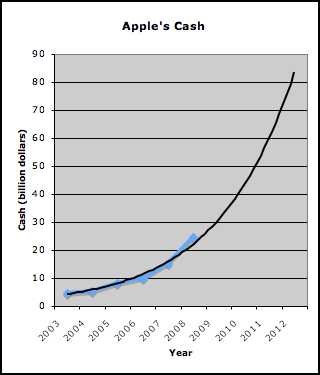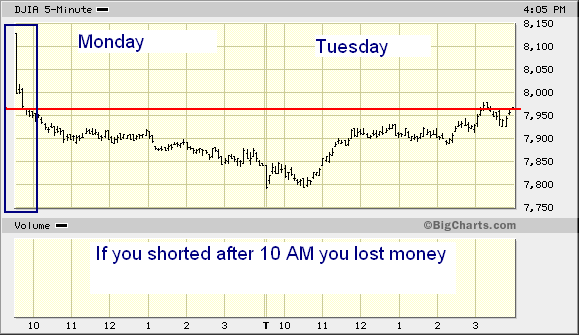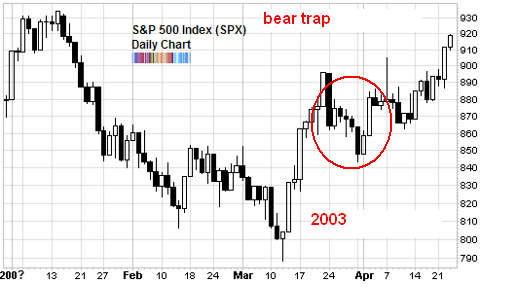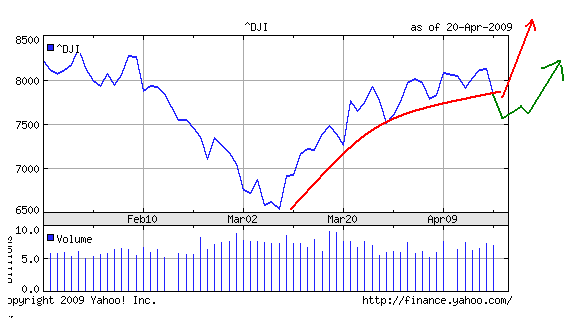The Stress Test Is So Stressful
Stocks surging yet again…the stress test is so stressful. Please for the love of god make the stress stop. I can’t take the stress anymore of watching my Google, Potash, and Mastercard stock keep going up. The worst fake financial crisis of the last seventy years is finally over. By printing over a trillion dollars in bailout and stimulus the supposed problem has been fixed. We can stop pretending the economy isn’t fundamentally strong. I agree with McCain:
Being right almost all the time does have its drawbacks, namely detractors. In the past few weeks some of my commenters have been asking if I’m really serious regarding my economic and stock market opinions, or this blog just a joke. I take offense at those who question my brilliance (I am the third wisest human on earth), those who doubt my stock picking skills, or my integrity as a smart economist. I know almost everything about economics, stocks, finance, and market history; or at least as much as some of the supposed experts. Economics doesn’t always have to be the gloomy science, hence I’m presenting a proactive, alternative viewpoint (and one that also happens to be correct, too).
My question to these doom and gloomers that populate the forums and blogosphere is: why do you want to see the United States economy and the stock market fail? Why do you oppose supply side even though empirical evidence for the past thirty years shows that it’s superior to any other school of macroeconomic thought? Why do you want to see millions of Americans lose more of their hard earned savings in the stock market? Why are you opposed to prosperity and economic favoritism for those who create wealth such as entrepreneurs?

Yesterday on Seeking Alpha author Zachary Scheidt expressed concern regarding tax payers having to front the stimulus and bailouts, as well as doubts regarding the stress tests. Once again, I don’t see why people are getting so worked up about the stress tests or taxes. My response is as follows
I think we’re getting bogged down with minutia. What you have to understand is that the one trillion is set aside already, and the fed is going to use it to restore liquidity to the banks because they need it, and regardless of stress tests, the bailouts are working as evidenced by the surging market and falling LIBOR rates, as just a examples.
Keep in mind though that deficits don’t matter in potentially deflationary environments. Debt isn’t necessarily bad for the economy. Tax payers don’t pay for the stimulus & bailouts because income taxes have not increased one penny since George W. bush’s original tax cuts. I expand on this here http://iamned.com/blog/?p=190
In addition, Tyler Durden wrote an article containing the following fallacious statement:
All in all it is not surprising that even as equity markets rally on unfounded green shoot rumors and technical liquidity aberrations, credit is preparing for a contraction and is ignoring the equity “rally” less and less. At some point, the fundamentals will catch up with stocks as will credit implied risk. Until then, the technicals are in charge and with liquidity marginalized, it is easy to see the markets will have significant spike on little to no volume for the foreseeable future.
I responded:
Maybe green shoots are justified because look at Apple, for example, it crushed estimates and reporting no slowdown despite recession hype.
There is plenty of credit and liquidity left for people who want to buy imacs, iphones, macbooks, and ipods.
I concur. I’s a misnomer to call this a ‘liquidity crisis’ or ‘credit crunch’ when companies Apple, amazon.com, Google, Potash, Wallmart, McDonalds, Research in Motion, the Facebook, Twitter continue to see huge growth and or crush wall street expectations. There is still huge credit and tons of liquidity.

Craig Brown, another seeking alpha, contributor writes:
A couple of points here. First, subprime is near or at a bottom. That is the good news. The bad news is that the dollars loaned in prime and Alt-A far exceed subprime and the dollars in delinquency on these loans now outstrip the dollars on defaulting subprime - go figure. Second, just when you think the worst might be past, mortgage defaults are setting new records in California.
My response:
But the market is ignoring all of that and surging because subprime isn’t a big deal. The market is looking ahead and saying ‘hmmmmm maybe things aren’t so bad after all’ lets rally.
Mortgage defaults are still, and will always remain, a very small percentage of total homes. Most of the defaults are, obviously, in bubble stricken areas that were written off long ago.
Agree. Why are we still talking about mortgages? That’s sooo 2007-2008. The market has already priced all future foreclosures.
I’ll conclude with with another easy listening song. Enjoy.
I Still Can’t See the Recession
Everyday I suffer the slings and arrows from short sellers and anti-spending doom and gloomers who still insist that there are problems with the economy even though I can’t see them. Or that supposedly people have no credit or liquidity. Where is the recession??? Please help me find it. This must be the worst invisible, yet over hyped recession in human history. How is it possible that Apple reports its best non-holiday quarter ever when there’s no credit?
Apple’s cash reserves are a sight to behold:

Yesterday the IMF (International Monetary Fund) reported that the global economy is supposedly in a deep recession.
My response posted on Seeking Alpha is as follows:
Thankfully, the huge funds that move the market are taking anything the IMF releases with a grain of salt. Bernanke says the economy will improve much sooner according to the beige book, and other indicators such as today’s housing numbers; the recession may have already ended. I trust Geithner, Summers, Obama, and Ben over the IMF.
Thursday’s economic calendar consists of the following events:
8:30 Jobless Claims
10:00 Existing Home Sales
10:30 EIA Natural Gas Report
4:30 PM Money Supply
Jobless claims…let me guess…the market is gonna surge. Job loss just not important. Homes sales will be better than expected, too. We should see a 2% rally today at least in major indexes.
Why is job loss not important? Because only the inefficient, unprofitable jobs are being cut. The government, service (legal, fast food, wall mart door greeter, nail & waxing salon, misc healthcare) and high tech (google, apple, facebook, twitter) sectors are thriving because these jobs are not only efficient in that they generate profit for their employers, but are also growth industries. Having too many jobs hurts the economy. Domestic manufacturing not important because America is longer a manufacturing nation.
Instead of offering tax breaks for companies that keep jobs in America, Obama should offer tax breaks for companies that ship jobs overseas because American labor is too expensive due to unnecessary pensions, health care, wages, and safety regulations. The benefits of cheaper labor is that the savings are passed on to the consumer, resulting in a higher standard of living. That’s why Americans have big screen TVs and larger automobiles compared to the Europeans.
Yesterday on Seeking Alpha James Quinn wrote this amusing article titled “What Will This Crisis Lead to?”

(props for this awesome jpeg)
Here was my response:
Sorry but I disagree with your comment and the article. There was hardly a crisis, and no bubble. And whatever crisis there was is ending given the uptick in economic indicators. This whole bear market is mostly a correction after a gauge run in the 80’s and 90’s.
Stocks are so undervalued that if the S&P 500 had a PE of 20 it would trade above 1500, amazingly. had there really been a crisis, PE ratios would be much higher. iamned.com/blog/ It seems like fundamentals of the US economy are holding up much better than many would be lead to believe by the mainstream media, as well as the blogosphere.
I concur. As the third wisest human in the world, I predict a v shaped recovery based on the propensity of US consumers to keep spending. I am very doubtful there will be any change in cultural sentiment that compels Americans to embrace long standing frugality. The state of play is a continuation of the same socioeconomic trends that began in the early 80’s of rising wealth gap, declining savings rates.

The banking system may seem fragile now, but that doesn’t mean it will remain that way, nor does it imply further downside in the stock market. The great depression recovery is an example of this. Banks were weak, but nevertheless stocks roared after World War Two.
Welfare liberalism isn’t compatible with making money in the stock market, or with valid economic analysis. I’m bullish and long Google and Potash and Mastercard. The DJIA will surge to 14,000 50,000…750,000… and beyond.

The Pain Will Continue
Yesterday was undeniably a letdown for bears with the S&P 500 closing at its high of the day for a gain of seventeen points. Already, signs of desperation and disappointment are beginning to set in again. Frantically, short sellers are reviewing their charts looking for any glimmers of hope that Monday’s plunge wasn’t merely profit taking after a historic six week rally, but the start of a protracted downtrend, as well as an opportunity to recoup large losses.
Virtually everyone who shorted on Monday is underwater because the market plunged in the first hour and then churned for the remainder of the day.

A retest of 740 on the S&P 500, as so many are hoping for, would be be too profitable and obvious for short sellers. The pain will continue. Just as this bear market was unusually steep and abrupt, the recovery may be, too. I don’t think short sellers will have the luxury of a protracted whipsaw deterioration like during the 2000-2003 tech wreck.
It’s also amusing how stress tests, ppip, tarp, IBM, Germany, subprime, Detroit just doesn’t move the market anymore. It seems the market is immune to bad news and keeps going higher. That’s because none of those stories are much of a big deal. No one cares about stress tests. No one cares about TARP or Detroit. No one cares about the fake recession. The huge funds run by smarties that move the market could care less about deficit spending, and instead they keep buying stocks like Google, Potash, Apple, Mastercard, and Amazon.com because we’re in a globalist new world order of hypercapitalism, spendism, web 2.0, materialism, and consumerism. We need to widen the wealth gap and increase consumer debt & spending so that cooperate profits and stock market goes up.
A widening wealth gap is paradoxically a sign of economic progress and advancement of western civilization. A thousand years from now when mars is terraformed and the DJIA has to be expressed in scientific notion you think there won’t be some people with unfathomable wealth, and others still confined to serfdom? In a globalist society, executives have a increasingly important role, which justifies their disproportionate pay. Efforts by the government to regulate executive pay, free trade, and compensation would hinder the economy, innovation, and ultimately delay the transition to a type 1 civilization.

There’s still a lot of belly aching over the PPIP program by the deficit hawks, but as always their impetus is a sadistic desire to see the US economy and stock market fail than by actual facts and logic. My response to these sore sore losers is as follows:
Keep in mind that taxpayers don’t pay a penny of the bailout or stimulus, and high debt levels are sustainable as I write in more detail here iamned.com/blog/?p=190 The Chinese will keep buying our treasury bonds, and income taxes have not risen a penny since George W. Bush’s original tax cuts.
I concur; the Geithner and Bernanke doing a good job. We need to bailout the too big to fail and preserve free market capitalism. Deficits just don’t matter.

In addition, I endorse tax cuts for the rich in response to redistributionist, welfare liberals who claim that taxes are too low:
But it’s the top earners & entrepreneurs who create jobs, efficiency, and economic prosperity for everyone else. That’s why they are most deserving of tax cuts. Low taxes is one reason why the US economy has done so well compared to the Eurozone.
Exactly. It’s liberals who want to spread the wealth around, as Obama even admitted during the third debate against McCain.
There was also some hemming and hawing yesterday regarding Caterpillar’s poor earning report as being harbinger of deepening recession, which I dismissed as trivial. Apparently the market also shared my sentiments with the DJIA surging over 120 points.
Sorry, but the market’s surging. Caterpillar is just one tiny part of the overall economy. There are many bright stops like large cap tech and fertilizer.
I agree. MOS and POT stock have nearly doubled from their 52 week lows because the global economy is recovering. Rising grain & food prices is good for the economy because it debunks the deflationary spiral.
I’ll conclude with an easy listening song that makes for a good soundtrack for this bull market.
Bearish Victory Will Be Short Lived
Yesterday was a day of celebration for short sellers, pessimists, and doom and gloomers. However, little do they realize that their victory will be short lived and the indexes will resume their march higher. This rally has legs. No meltdown, no retest of lows, no more doom and gloom. Bernanke, Obama, and Geithner are doing a good job infusing liquidity and bailing out the too big to fail so that investor confidence rises, in addition to the stock market. So far it’s working. Don’t fight the fed. I wonder how many people have shorted yesterday? And how many will have covered in panic by Friday?
In the 2003-2007 bull market there was a sharp, albeit brief selloff in late March, which many bears mistakenly interpreted as a major reversal. Nope. The rally continued to their dismay, and they were forced to cover.

There is still considerable support on the SPX as shown from the chart below:

here is a similar chart for the SPY showing support:

Here is another chart showing two different outcomes for how the market will rally. The green projection is more conservative with the DJIA retesting 7500.

There will be no decoupling. Just like in the 2002-2007 bull market oil, gas prices,wheat, soybeans,corn, copper, United States & BRIC indexes will all rise together. The dollar will resume its long term decline, which began in 2001.
The US dollar index is forming a head and shoulders and is due for a major retracement; a very bad sign for bears as risk taking returns and the over hyped recession comes to a close:

As the dollar plunges and stock and commodities surge, gas prices will also rally. I expect to see $4 gas again within eighteen months, but it will have no impact on consumer demand because people still need to get to work and travel for leisure, and gas prices are considered inelastic. According to investopedia: When a price change has no effect on the supply and demand of a good or service, it is considered perfectly inelastic.
The UGA gas prices etf is a good proxy for national gas prices

In conclusion, I expect commodities, BRIC, US indexes to resume their rally. The dollar will plunge, and there will be a lot of panic covering in the days and weeks to come as shorts scramble to secure what little profit they extracted from Monday’s big sell off. Buy Google, Apple, Rimm, Amzn, EWZ, FXI, Pot, Mos, and other cheap dollar, globalist, plays on the dips.
I signed up for twitter, too
http://twitter.com/iamned